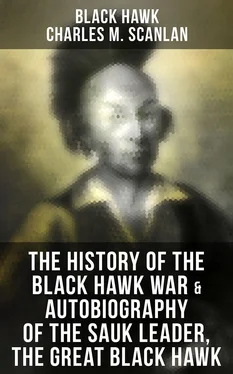This was all they could remember of what had been said and done. It subsequently appeared that they had been drunk the greater part of the time while at St. Louis.
This was all myself and nation knew of the treaty of 1804. It has since been explained to me. I found by that treaty, that all of the country east of the Mississippi, and south of Jeffreon was ceded to the United States for one thousand dollars a year. I will leave it to the people of the United States to say whether our nation was properly represented in this treaty? Or whether we received a fair compensation for the extent of country ceded by these four individuals?
I could say much more respecting this treaty, but I will not at this time. It has been the origin of all our serious difficulties with the whites.
Sometime after this treaty was made, a war chief with a party of soldiers came up in keel boats, encamped a short distance above the head of the Des Moines rapids, and commenced cutting timber and building houses. The news of their arrival was soon carried to all our villages, to confer upon which many councils were held. We could not understand the intention, or comprehend the reason why the Americans wanted to build homes at that place. We were told that they were a party of soldiers, who had brought great guns with them, and looked like a war party of whites.
A number of people immediately went down to see what was going on, myself among them. On our arrival we found that they were building a fort. The soldiers were busily engaged in cutting timber, and I observed that they took their arms with them when they went to the woods. The whole party acted as they would do in an enemy's country. The chiefs held a council with the officers, or head men of the party, which I did not attend, but understood from them that the war chief had said that they were building homes for a trader who was coming there to live, and would sell us goods very cheap, and that the soldiers were to remain to keep him company. We were pleased at this information ad hoped that it was all true, but we were not so credulous as to believe that all these buildings were intended merely for the accommodation of a trader. Being distrustful of their intentions, we were anxious for them to leave off building and go back down the river.
By this time a considerable number of Indians had arrived to see what was doing. I discovered that the whites were alarmed. Some of our young men watched a party of soldiers, who went out to work, carrying their arms, which were laid aside before they commenced. Having stolen quietly to the spot they seized the guns and gave a wild yell! The party threw down their axes and ran for their arms, but found them gone, and themselves surrounded. Our young men laughed at them and returned their weapons.
When this party came to the fort they reported what had been done, and the war chief made a serious affair of it. He called our chiefs to council inside his fort. This created considerable excitement in our camp, every one wanting to know what was going to be done. The picketing which had been put up, being low, every Indian crowded around the fort, got upon blocks of wood and old barrels that they might see what was going on inside. Some were armed with guns and others with bows and arrows. We used this precaution, seeing that the soldiers had their guns loaded and having seen them load their big guns in the morning.
A party of our braves commenced dancing and proceeded up to the gate with the intention of, going in, but were stopped. The council immediately broke up, the soldiers with their guns in hands rushed out from the rooms where they had been concealed. The cannon were hauled to the gateway, and a soldier came running with fire in his hand, ready to apply the match. Our braves gave way and retired to the camp. There was no preconcerted plan to attack the whites at that time, but I am of the opinion now that had our braves got into the fort all of the whites would have been killed, as were the British soldiers at Mackinac many years before.
We broke up our camp and returned to Rock river. A short time afterward the party at the fort received reinforcements, among whom we observed some of our old friends from St. Louis.
Soon after our return from Fort Madison runners came to our village from the Shawnee Prophet. Others were despatched by him to the village of the Winnebagoes, with invitations for us to meet him on the Wabash. Accordingly a party went from each village.
All of our party returned, among whom came a prophet, who explained to us the bad treatment the different nations of Indians had received from the Americans, by giving them a few presents and taking their land from them.
I remember well his saying: "If you do not join your friends on the Wabash, the Americans will take this very village from you!" I little thought then that his words would come true, supposing that he used these arguments merely to encourage us to join him, which we concluded not to do. He then returned to the Wabash, where a party Of Winnebagoes had preceded him, and preparations were making for war. A battle soon ensued in which several Winnebagoes were killed. As soon as their nation heard of this battle, and that some of their people had been killed, they sent several war parties in different directions. One to the mining county, one to Prairie du Chien, and another to Fort Madison. The latter returned by our village and exhibited several scalps which they had taken. Their success induced several parties to go against the fort. Myself and several of my band joined the last party, and were determined to take the fort. We arrived in the vicinity during the night. The spies that we had sent out several days before to watch the movements of those at the garrison, and ascertain their numbers, came to us and gave the following information: "A keel arrived from below this evening with seventeen men. There are about fifty men in the fort and they march out every morning to exercise." It was immediately determined that we should conceal ourselves in a position as near as practicable to where the soldiers should come out, and when the signal was given each one was to fire on them and rush into the fort. With my knife I dug a hole in the ground deep enough that by placing a few weeds around it, succeeded in concealing myself. I was so near the fort that I could hear the sentinels walking on their beats. By day break I had finished my work and was anxiously awaiting the rising of the sun. The morning drum beat. I examined the priming of my gun, and eagerly watched for the gate to open. It did open, but instead of the troops, a young man came out alone and the gate closed after him. He passed so close to me that I could have killed him with my knife, but I let him pass unharmed. He kept the path toward the river, and had he gone one step from it, he must have come upon us and would have been killed. He returned immediately and entered the gate. I would now have rushed for the gate and entered it with him, but I feared that our party was not prepared to follow me.
The gate opened again when four men emerged and went down to the river for wood. While they were gone another man came out, walked toward the river, was fired on and killed by a Winnebago. The others started and ran rapidly towards the fort, but two of them were shot down dead. We then took shelter under the river's bank out of reach of the firing from the fort.
The firing now commenced from both parties and was kept up without cessation all day. I advised our party to set fire to the fort, and commenced preparing arrows for that purpose. At night we made the attempt, and succeeded in firing the buildings several times, but without effect, as the fire was always instantly extinguished.
The next day I took my rifle and shot in two the cord by which they hoisted their flag, and prevented them from raising it again. We continued firing until our ammunition was expended. Finding that we could not take the fort, we returned home, having one Winnebago killed and one wounded during the siege.
Читать дальше





![Theresa Cheung - The Dream Dictionary from A to Z [Revised edition] - The Ultimate A–Z to Interpret the Secrets of Your Dreams](/books/692092/theresa-cheung-the-dream-dictionary-from-a-to-z-r-thumb.webp)






